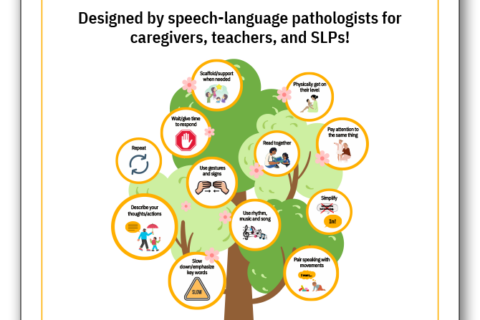How Brain Injuries Affect Your Speaking Ability
Nobody is immune to a brain injury. Unfortunately, anomalous and unanticipated accidents can happen to anyone, anywhere. A traumatic brain injury (TBI) can arise as a result of a car accident, sports injury, or countless other unexpected calamities that impact the brain. This blog will cover speech problems that can occur after a brain injury and how speech therapy can treat these conditions.
Effects of TBI
There are more than 200,000 TBI-related hospitalizations each year in the United States, which amounts to more than 600 per day, according to the Centers for Disease Control and Prevention.
Survivors of TBI often experience changes to multiple regions of the brain. As a result, it is common for most to experience a combination of symptoms that affect language proficiency (known as aphasia) and cognitive skills (known as cognitive-communication impairments).
The effects of TBI are as varied as they are discrete among individuals as the sites of lesion and severity of impact along with numerous other personal factors affect symptom presentation and rates of recovery.
Most, however, experience some type of change to their physical mobility as well as their speech and language skills, and ease thinking or performing cognitive tasks. The culmination of an unexpected life trauma permeating physical and communicative capacities often have diffuse impacts on psychosocial functioning. Confidence, emotional regulation amidst cognitive changes, personality differences, and coping with changes in perception of oneself/identity are also intricately entwined with TBI.
Aphasia After Traumatic Brain Injury
Aphasia is an acquired, neurological language disorder that impacts various aspects of speaking, understanding, reading, and writing. Aphasia may make it difficult to efficiently produce appropriate semantic and syntactic sentences when talking or, it may interfere with the ability to easily understand what is being said.
Read more on our blog about how you can recover from aphasia.
Cognitive Problems After Traumatic Brain Injury
Cognitive communication difiiculties may inhibit skills related to attention, perception, memory, planning, and organization – all skills that bely language proficiency. This may result in reduced ability to maintain and appropriately transition topics of conversation, speak in an organized, coherent, and cohesive manner, and/or integrate or interpret meaning from tone, body language, and facial expressions.
Cognitive communication impairments may also interfere with efficient attention and memory making it difficult to hold on to all important details, extract the most meaningful points, and interpret underlying messages to capture the full gist of any given information.
Traumatic Brain Injury Functional Limitations
Communication partners may find they have trouble following the logic of survivor’s narratives and personal stories. Conversations may have an overabundance of information and may lack a cohesive point as survivor’s struggle to extract extraneous details, retrieve words efficiently, and accurately repeat or recall information.
Simultaneously, survivors of TBI may become easily overwhelmed by longer streams of information or tasks with multiple components as they grapple with a reduced processing speed and decreased working memory abilities which can cause them to feel quickly flooded by details.
Speech Problems After Brain Injury
Due to the diffuse nature of trauma caused by TBI, aspects of speech production may also be impacted. Below we describe common speech impairments following TBI: dysarthria and apraxia.
What Is Dysarthria?
Dysarthria refers to a group of neurological speech sound disorders caused by muscle weakness. When any muscle required for speaking is impacted, it can make it hard to accurately produce the sounds of words. This can make it challenging to talk or say the words you want to say and it may also make it hard to be easily understood by others.
When there is a disruption to the brain it can negatively impact the overall strength, control and coordination of the muscles required for speaking. This interrupts neural pathways that command the actions of specific muscles required for speaking (such as the tongue, lips, face, larynx, diaphragm).
The neural messages that specify at which speed, force, direction, and in which order muscles should fire are impaired. As a result, the muscles do not move with the necessary speed, strength, range of motion, timing, and accuracy required for crisp, clear words. This difficulty can impact multiple areas of the motor-speech system including respiration, phonation, articulation, prosody, and resonance. Speech may sound slurred, robotic or choppy, very fast or very slow, nasal, hoarse or breathy.
What Is Apraxia?
Apraxia refers to another type of speech sound disorder. Whereas the underlying cause of dysarthrias is muscle weakness, in the case of apraxia, the muscles involved in speech exhibit normal ranges of strength and coordination.
The issue lies in the brain’s difficulty communicating the plan and sequence of movement required to produce words. As a result, the structures involved in speech (e.g., the tongue, lips, facial muscles) struggle to perform volitional movements and are challenged to command the muscles to move in the correct sequence or order. This leads to groping as individuals endeavor to achieve necessary articulatory postures for crisp, clear words. Speech errors are often variable and inconsistent.
Regaining Speech After Brain Injury
If any aspect of your speech and communication is impacted following a brain injury, obtaining high quality, skilled intervention as soon as possible will help you maximize your recovery potential.
Working with a skilled, professionally licensed speech-language therapist can have a profound impact on speech, language, and cognitive communication recovery and functioning – helping to keep survivors connected to their loved ones and care teams all along their recovery journey and most especially during a particularly vulnerable time in their lives.
There are a number of evidenced based treatments to address different motor speech and cognitive-linguist challenges following a TBI. The right treatment plan that uses appropriate treatment techniques, integrates key tenants of neuroplasticity and motor learning (intensity, repetition, saliency!) combined with personal motivation will help you optimize your speech and communication following a brain injury.
Clear, crisp speech relies on a sophisticated balance between efficient brain to muscle communication and the dynamic coordination of the respiratory (breath), phonatory (voice), and articulatory (speech) system. Therefore, at Open Lines®, we draw on treatment approaches that strengthen the overall coordination and efficiency of your motor-speech system by using a series of evidence-based exercises that optimizes breath support, vibratory efficiency of the vocal folds, vocal loudness, resonance, and articulatory precision.
We will guide you through tailored drill-like exercises and functional speaking activities that will teach you how to use specific techniques that modify or strengthen speech and communication centers in your brain to help you speak with ease and confidence.
Your personal recovery journey depends on many factors including the nature of your injury, location, and impact of injury, as well as your personal goals and support system. Wherever you may be starting from, we are here to help you make a plan that works, stay the course, and experience a positive outcome.
Speech Therapy After Traumatic Brain Injury
Treatment for TBI aims to strengthen and retrain the cognitive and language skills that underpin effective communication.
In general, speech therapy targets the following:
- Speaking
- Listening and Understanding
- Reading
- Writing
- Attention
- Memory
- Problem solving
- Reasoning skills
Strengthening these skills can make it easier to understand and interpret spoken and written language, convey ideas, plan and organize personal and professional activities, and juggle multiple pieces of information. It furthermore supports speaking in an organized and cohesive manner so you or your loved one can continue to feel confident participating meaningfully in conversations with family, peers, and colleagues.
Specific aspects of language which may be impacted such as word retrieval are also integrated into treatment plans using targeted exercises.
Treatment also addresses environmental modifications, drill-based exercises, and functional activities to help optimize communication in any setting be it social, profession, or academic. Environmental modifications may include use of visual calendars and graphic organizers to support attention, visual interpretation of information, organization, and planning.
Exercises such as visualization techniques may be used to increase attention and memory. You may also take part in functional activities such as role-play conversations or preparation of functional tasks that can help you regain your confidence with your professional and personal responsibilities.
Treating Traumatic Brain Injuries at Open Lines®
At Open Lines®, every treatment plan begins with an individual one-on-one assessment with a licensed speech-language pathologist. Your therapist will take you through a series of tests to obtain a detailed and holistic understanding of your strengths, areas of need, and personal goals.
We use this information to develop a personal plan of action encompassing evidence-based intervention methods tailored to your needs to harness your strengths, optimize your speech, and enable you to maintain positive and lasting outcomes. We recognize that achieving lasting change goes beyond simply treating symptoms and therefore we ensure that our care plans addresses any impact your emotions or psychological state may have on your ability to think and communicate.
Our approach integrates empathetic listening and mindfulness approaches along with neuro- scientifically supported drill-based exercises and functional practice so you can quickly generalize the gains you make in therapy and apply learned skills from your professional speech therapy sessions to all aspects of your day-to-day. The end goal is to transfer the skills learned in speech therapy to your career, personal life, and favorite hobbies.
Examples of treatment approaches may include motor-speech drills that aim to improve the strength and efficiency of respiratory and phonatory coordination. Various pacing strategies and articulation techniques can be effective in retaining accurate articulatory postures and improving the coordination of speech sounds so that conversational speech is easily understood.
Some individuals may be candidates for LSVT LOUD, the gold standard speech intervention method for individuals with speech and voice disorder due to Parkinson’s disease. In addition to treating Parkinson’s, it has also been recognized for its notable benefits for persons with other neurological conditions. Extensively researched for over 25 years, LSVT LOUD has helped people living with neurologically based voice and speech disorders experience lasting outcomes.
Every speech-language pathologist at Open Lines® is specially trained and certified to the highest standard in the delivery of this treatment protocol. The program’s focus is on achieving healthy, adequate vocal loudness with good vocal quality through a series of structured exercises. Following the LSVT LOUD program, you can expect to experience greater vocal control, ease, comfort, and communicative success when speaking.
If you’re struggling with communication difficulties, it’s time to turn to Open Lines®. Contact us via phone (212-430-6800), email [email protected], or by filling out our convenient contact form. Improve your communication skills and unlock your potential with Open Lines® Speech and Communication in New York today!
Get in Touch With Open Lines®














